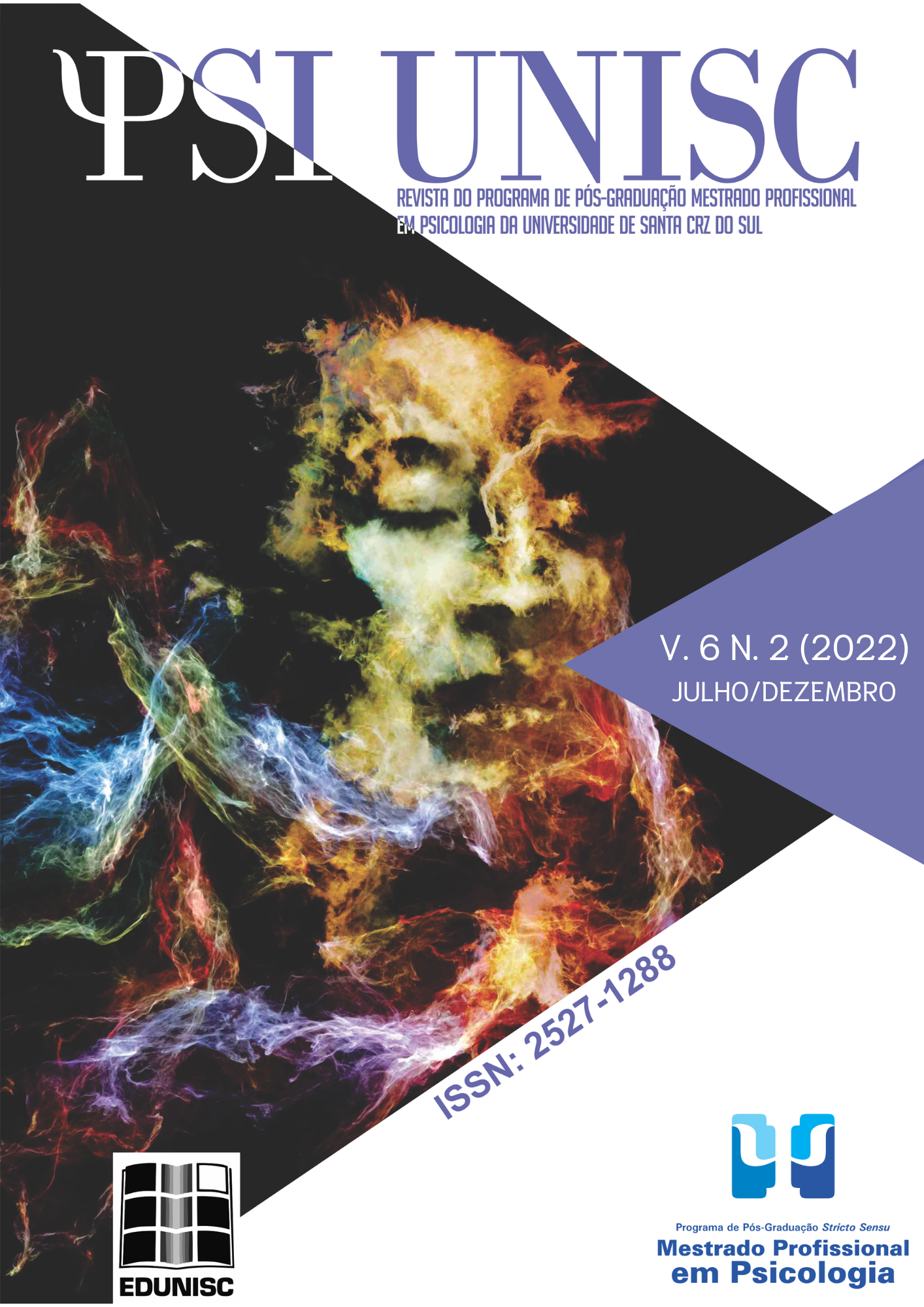Mental health of transgender people: integrative literature review
DOI:
https://doi.org/10.17058/psiunisc.v6i2.17227Keywords:
Transgender, Mental health, Risk factors, Protective factors, Integrative literature reviewAbstract
The transgender phenomenon occurs when the person does not identify with the gender assigned at birth, which is usually marked by conflicts and internal struggles. This study aimed to map national and international studies on the mental health of transgender people in the last five years. An integrative literature review was developed, following the PRISMA protocol (Preferred Reporting Items for Systematic Reviews and Meta Analyzes), through four databases (Lilacs, Scielo, APA Psycinfo and Web of Science), using the descriptors “transsexual OR transgender ” AND “mental health. The results were analyzed from 16 articles located and divided into three categories: mental health problems, risk factors and protective factors. There was a high prevalence of problems to the mental health of transgender people, such as depressed and anxious symptoms, use of psychoactive substances and alcohol, suicidal attempt and ideation, self-injurious behavior and decreased self-esteem. The main risk factors were social stigma and prejudice, in addition to lack of social support. On the other hand, the protective factors for mental health were social support, a functional marital relationship and the possibility of gender affirmation processes. It is concluded that it is extremely important that the Brazilian scientific scenario can contribute to a deeper understanding of mental health issues in the national context and to plan intervention strategies for social inclusion and combating prejudice against gender identity.
Downloads
References
American Psychiatric Association – APA (2014). Manual Diagnóstico e Estatístico de Transtornos Mentais (Diagnostic and Statistical Manual of Mental Disorders) - 5t ed. (DSM-V). Porto Alegre: Artmed.
American Psychiatric Association – APA (2015). Guidelines for psychological practice with transgender and gender nonconforming people. American Psychological Association, 70(9), 832-864. https://doi.org/10.1037/a0039906
Associação Nacional de Travestis e Transexuais – ANTRA (2018). Mapa dos assassinatos de travestis e transexuais no Brasil em 2017.
Associação Nacional de Travestis e Transexuais – ANTRA (2020). Boletim nº 02/2020. Assassinatos contra Travestis e Transexuais em 2020. Disponível em: https://antrabrasil.files.wordpress.com/2020/05/boletim-2-2020-assassinatos-antra.pdf
Associação Nacional de Travestis e Transexuais – ANTRA (2021). Dossiê dos assassinatos e da violência contra travestis e transexuais brasileiras em 2020. São Paulo: Expressão Popular.
Asscheman, H., Giltay, E. J., Megens, J. A., de Ronde, W. P., van Trotsenburg, M. A., & Gooren, L. J. (2011). A long-term follow-up study of mortality in transsexuals receiving treatment with cross-sex hormones. European Journal Endocrinology, 164(4), 635–642. https://doi.org/10.1530/eje-10-1038
Barrientos, J., Espinoza-Tapia, R., Opazo, P. M., Saiz, J. L., Castro, M. C., Guzmán-Gonzáles, M., Ojeda, F. G., Correa, J. B., Saavedra, L. L. (2019a). Efectos del prejuicio sexual en la salud mental de personas transgenero chilenas desde el Modelo de Estrés de las Minorías: Una aproximación cualitativa. Terapia Psicológica, 37(3), 181-197. http://dx.doi.org/10.4067/S0718-48082019000300181
Barrientos, J., Saiz, J. L., Gómez, F., Guzmán-González, M., Espinoza-Tapia, R., Cárdenas, M., Bahamondes, J. (2019b). La investigácion psicossocial actual referida a la salud mental de las pessoas transgenero: uma mirada desde chile. Psikhe, 28(2), 1-13. http://dx.doi.org/10.7764/psykhe.28.2.1482
Bomtempo, J., & Mendes, J. A. A. (2020). Risco, proteção e empoderamento na adolescência transexual: Reflexões a partir de um estudo de caso. In: Lima, Andrade & Cunha. Juventudes: Pesquisas e campos de atuação (pp. 37-52). Editora CRV.
Butler, J. (2004). Undoing gender. Routledge.
Cardoso, Hugo Ferrari, Borsa, Juliane Callegaro, & Segabinazi, Joice Dickel. (2018). Indicadores de saúde mental em jovens: fatores de risco e de proteção. Estudos Interdisciplinares em Psicologia, 9(3, Supl. 1), 3-25.
Carvalho, K. G., et al. (2019). Comportamento suicida em minorias sexuais: prevalência e fatores associados. Revista Eletrônica Acervo Saúde, 11(14), 1-9. https://doi.org/10.25248/reas.e867.2019
Conselho Federal de Psicologia [homepage na internet]. Resolução CFP N° 001/2018 de janeiro de 2018. Estabelece normas de atuação para as psicólogas e os psicólogos em relação às pessoas transexuais e travestis. [Acesso em: 13 de abr 2019]. Disponível em: https://site.cfp.org.br/wpcontent/uploads/2018/01/resolucao_cfp_01_2018.pdf.
Conselho Federal de Psicologia (2005). Resolução CFP n° 010/2005. Código de Ética Profissional do Psicólogo. Brasília, DF: CFP. [Acesso em: 13 de abr 2019]. Disponível em: https://site.cfp.org.br/wpcontent/uploads/2012/07/Co%CC%81digo-de-%C3%89tica.pdf
Connolly, M. D., Zervos, M. J., Barone, C. J., Johnson, C. C., & Joseph, C. L. M. (2016). The mental health of transgender youth: Advances in understanding. Journal of Adolescent Health, 59(5), 489–495. https://doi.org/10.1016/j.jadohealth.2016.06.012
Corrêa, F. H. M., Rodrigues, B. B., Mendonça, J. C., Cruz, L. R. (2020). Pensamento suicida entre a população transgênero: um estudo epidemiológico. Jornal Brasileiro Psiquiatria, 69(1), 13-22. https://doi.org/10.1590/0047-2085000000256
Diemer, E. W., Grant, J. D., Munn-Chernoff, M. A., Patterson, D. A., & Duncan, A. E. (2016). Pathology in a national sample of college students. Journal of Adolescent Health, 57(2), 144–149. https://doi.org/10.1016/j.jadohealth.2015.03.003.Gender
Fontanari, A. M. V. (2019). Fatores associados a saúde mental de jovens transgêneros e/ou não-binários. Tese de Doutorado. Universidade Federal do Rio Grande do Sul (UFRGS).
Fleury, H. J., AbdoI, C. H. N. (2018). Atualidades em disforia de gênero, saúde mental e psicoterapia. Diagn Tratamento, 23(4):147-51.
Galvão, T. F., Pansani, T. S. A., & Harrad, D. (2015). Principais itens para relatar Revisões sistemáticas e Meta-análises: A recomendação PRISMA. Epidemiologia e Serviços de Saúde [online], 24(2), pp. 335-342. Disponível em: <https://doi.org/10.5123/S1679-49742015000200017>. Epub Apr-Jun 2015. ISSN 2237-9622.
Gamarel, K. E., Sevelius, J. M., Reisner, S. L., Coats, C. S., Nemoto, T., Operario, D. (2019). Commitment, interpersonal stigma, and mental health in romantic relationships between transgender women and cisgender male partners. Journal of Social and Personal Relationships, 1–22. DOI: 10.1177 / 0265407518785768
Gaspodini, I. B., Rissi, V. (2019). Processo transexualizador: apontamentos sobre o papel do(a) psicólogo(a). Anais do VI Mostra de Pesquisa e Pós-Graduação da IMED e VII Mostra de Iniciação Científica e Extensão Comunitária.
GGB, Grupo Gay da Bahia. Mortes violentas de LGBT no brasil, Relatório 2017. Disponível em: < https://homofobiamata.files.wordpress.com/2017/12/relatorio-2081.pdf>
Guzmán-González, M., et al. (2020). Salud mental en población transgénero y género no conforme en Chile. Rev. Med. Chile, 148, 1113-1120. http://dx.doi.org/10.4067/S0034-98872020000801113
Houaiss, A. (2001). Dicionário Houaiss da Língua Portuguesa. Rio de Janeiro, Ed. Objetiva.
Hughto, J. M. W., Gunn, H. A., Rood, B. A., Pantalone, D. W. (2020). Social and Medical Gender Afirmation Experiences Are Inversely Associated with Mental Health Problems in a U.S. Non‐Probability Sample of Transgender Adults. Archives of Sexual Behavior, 49, 2635–2647. https://doi.org/10.1007/s10508-020-01655-5
Jesus, J. G. (2012). Orientações sobre identidade de gênero: conceitos e termos. Guia técnico sobre pessoas transexuais, travestis e demais transgêneros, para formadores de opinião. Brasília.
Jesus, J. G. (2013). Crianças trans: memórias e desafios teóricos. Anais do III seminário internacional enlaçando sexualidades. Salvador. UFBA, p. 1-14.
Jones, B. A, Bouman, W. P., Haycraft, E., Arcelus, J. (2019). Mental health and quality of life in non-binary transgender adults: A case control study. International Journal Of Trransgenderism., 20(2–3), 251-562. https://doi.org/10.1080/15532739.2019.1630346
Katz-Wise, S. L., Reisner, S. L., Hughto, J. M. W., Budge, S. L. (2017). Self-Reported Changes in Attractions and Social Determinants of Mental Health in Transgender Adults. Arch Sex Behav., 46(5), 1425–1439. https://doi:10.1007/s10508-016-0812-5
Lee, H., Tomita, K. K., Habarth, J. M., Operario, D., Yi, Choo, S., Kim, S. (2020). Internalized transphobia and mental health among transgender adults: A nationwide cross-sectional survey in South Korea. International Journal Of Transgender Health, 21(2), 182–193. https://doi.org/10.1080/26895269.2020.1745113
Lobato, M. I. et al. (2019). Psychological distress among transgender people in Brazil: frequency, intensity and social causation – an ICD-11 field study. Braz J Psychiatry, 41(4):310-315. https://doi.org/10.1590/1516-4446-2018-0052
Lombardi, E. L. et al. (2002). Gender violence: transgender experiencies with violence and discrimination. Journal of Homosexuality, 42(1), 89-101. http://dx.doi.org/10.1300/J082v42n01_05
Melo, T. G. R.; Sobreira, M. V. S. (2018). Identidade de gênero e orientação sexual: perspectivas literárias. Temas em Saúde, 18(3).
Meyer, I. H. (2003). Prejudice, social stress, and mental health in lesbian, gay, and bisexual populations: conceptual issues and research evidence. Psychological Bulletin, 129(5), 674–697. https://doi.org/10.1037/0033-2909.129.5.674
McConnell, E. A., Birkett, M., Mustanski, B. (2016). Families Matter: Social Support and Mental Health Trajectories Among Lesbian, Gay, Bisexual, and Transgender Youth. J Adolesc Health, 59(6), 674-680. https://doi:10.1016/j.jadohealth.2016.07.026
Newcomb, M. E. et al. (2020). High Burden of Mental Health Problems, Substance Use, Violence, and Related Psychosocial Factors in Transgender, Non-Binary, and Gender Diverse Youth and Young Adults. Arch Sex Behav, 49(2): 645–659. http://doi: 10.1007 / s10508-019-01533-9
Olson, K. R., Durwood, L., DeMeules, M., & McLaughlin, K. A. (2016). Mental health of transgender children who are supported in their identities. Pediatrics, 137(3), 1–8. https://doi.org/10.1542/ peds.2015-3223
Paveltchuk, F. O., & Borsa, J. C. (2020). A teoria do estresse de minoria em lésbicas, gays e bissexuais. Revista da SPAGESP, 21(2), 41-54.
Pesce, R. P., Assis, S. G, Santos, N., & Oliveira, R. V. Carvalhaes (2004). Risco e proteção: Em busca de um equilíbrio promotor de resiliência. Psicologia: Teoria e Pesquisa, 20(2), 135-143. doi:10.1590/S0102- 37722004000200006.
Poletto, M., & Koller, S. H. (2008). Contextos ecológicos: Promotores de resiliência, fatores de risco e de proteção. Estudos de Psicologia (Campinas), 25(3), 405-416. doi:10.1590/S0103-166X2008000300009.
Price-Feeney, M. P., Green, A. E., Dorrison, S. (2019). Understanding the Mental Health of Transgender and Nonbinary Youth. Journal of Adolescent Health, 66. https://doi.org/10.1016/j.jadohealth.2019.11.314
Puckett, J. A, Matsuno, E., Dyar, C., Mustanski, B., Newcomb, M. E. (2019). Mental Health and Resilience in Transgender Individuals: What Type of Support Makes a Difference? Journal of Family Psychology, 33(8), 954–964. http://dx.doi.org/10.1037/fam0000561
Rimes, K. A., GoodShip, N., Ussher, G., Baker, D., West, E. (2019). Non-binary and binary transgender youth: Comparison of mental health, self-harm, suicidality, substance use and victimization experiences. International Journal Of Transgenderism, 20(2–3), 230–240. https://doi.org/10.1080/15532739.2017.1370627
Ruiz, M. S. (2021). Subverting gender boundaries: non-binary gender. Research, Society and Development, 10(2), p. e51610212801. http://doi: 10.33448/rsd-v10i2.12801
Ryan, C., Russell, S., Huebner, D., et al. (2010). Family acceptance in adolescence and the health of LGBT young adults. J Child Adolesc Psychiatr Nurs, 23:205e13. http://doi:10.1111/j.1744-6171.2010.00246.x
Sá, J. P. M. (2017). Tratamento da Disforia de Género. Dissertação de Mestrado. Universidade do Porto, Portugal.
Silva, R. G. L. B. da, Bezerra, W. C., & Queiroz, S. B. de. (2015). Os impactos das identidades transgênero na sociabilidade de travestis e mulheres transexuais. Revista De Terapia Ocupacional Da Universidade De São Paulo, 26(3), 364-372. https://doi.org/10.11606/issn.2238-6149.v26i3p364-372
Transgender Europe (TGEU). Projeto de investigação TvT (2021). Observatório de Pessoas Trans Assassinadas (TMM). Transrespect versus Transphobia Worldwide (TvT) project.
Thornea, N., Witcombb, G. L., Niederc, T., Nixona, E., Yipd, A., Arcelus, J. (2019). A comparison of mental health symptomatology and levels of social support in young treatment seeking transgender individuals who identify as binary and non-binary. International Journal Of Transgenderism, 20(2–3), 241–250. https://doi.org/10.1080/15532739.2018.1452660
Trujillo, M. A., Perrin, P. B., Sutter, M., Tabaac, A., Benotsch, E. G. (2017). The buffering role of social support on the associations among discrimination, mental health, and suicidality in a transgender sample. Int J Transgend., 18(1), 39–52. http://doi:10.1080/15532739.2016.1247405
Veale, J. F., Watson, R. J., Peter, T., Saewyc, E. M. (2017). The mental health of Canadian transgender youth compared with the Canadian population. J Adolesc Health, 60(1), 44–49. http://doi:10.1016/j.jadohealth.2016.09.014
World Health Organization (WHO). International Classification of Diseases 11th revision (ICD-11). Disponível em: https://icd.who.int/. Acesso em 27 de agosto de 2021.
Downloads
Published
How to Cite
Issue
Section
License
The submission of originals to this journal implies the transfer, by the authors, of the printed and digital publication rights. The copyrights for the published articles are those of the author, with periodical rights on the first publication. Authors may only use the same results in other publications clearly indicating this journal as the medium of the original publication. Because we are an open access journal, we allow free use of articles in educational and scientific applications provided the source is cited under the Creative Commons CC-BY license.




